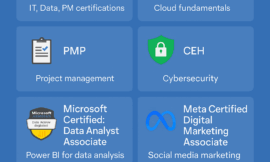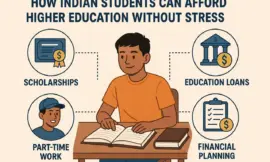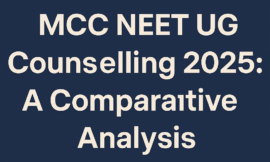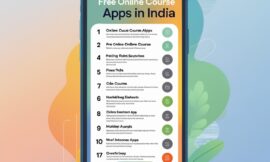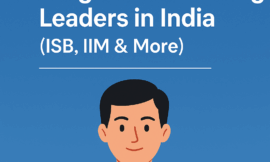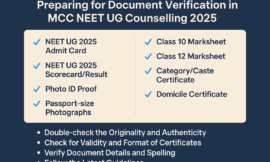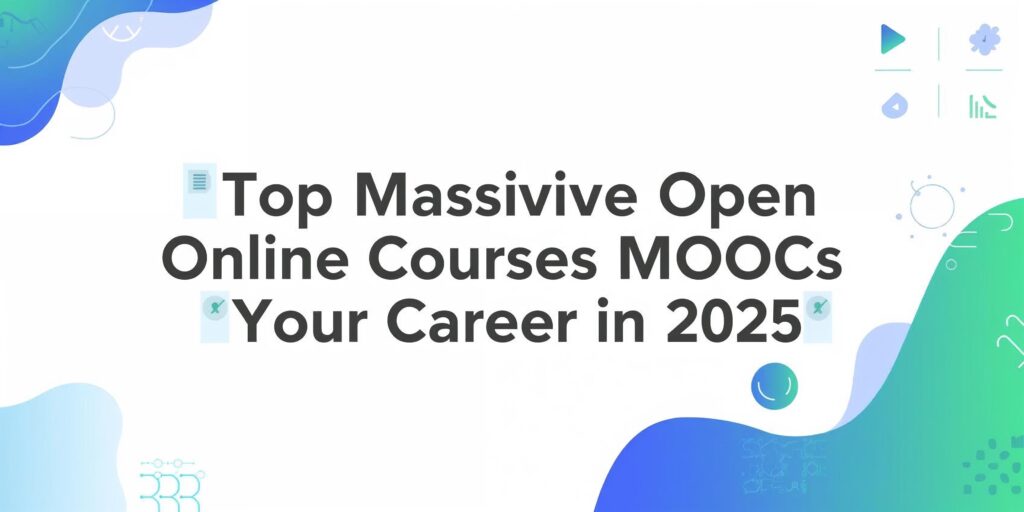
Top Massive Open Online Courses (MOOCs) to Boost Your Career in 2025
Learning new skills online is one of the best ways to grow your career.
In 2025, online courses — called MOOCs (short for Massive Open Online Courses) — are bigger and better than ever.
They help people learn things like how to work with computers, use AI, protect data, or run a business.
Best of all, many of these courses are made by top universities and big companies.
This guide will show you the best platforms, the most useful courses, and step-by-step tips so you can pick the right course and actually use it to get ahead.
Let’s start!
Why MOOCs are so powerful right now
First, why should you care about MOOCs? Here are the simple reasons:
- They are at home on the internet, so you can learn from anywhere.
- Many courses are made by famous universities and big companies.
- You can learn fast and at your own speed.
- Many courses help you build things you can show to employers — like projects and certificates.
More people are learning AI, data and tech now than before.
In fact, courses about AI and generative AI grew a lot recently.
This shows that learning AI gives you a big advantage in jobs today.
The big, trusted MOOC platforms in 2025

There are many places to learn online. These are the biggest and most trusted ones you should know:
- Coursera — works with top universities and big companies. It has many certificates and career programs.
- edX — offers university-level courses and MicroMasters programs.
- Udacity — is strong for tech skills and “Nanodegrees” for jobs like data science and AI.
- Udemy — has many practical courses made by teachers and professionals.
- LinkedIn Learning — gives short courses for business and career skills.
- DataCamp — focuses on data science and coding practice.
- FutureLearn and other smaller platforms — good for different styles of learning and special topics.
A long list of MOOC platforms and their features is available so you can compare them.
30 Best Coding Apps for Indian Students to Learn Programming on Mobile
More MOOC Platforms and In-Demand Skills to Explore in 2025
We have already looked at the biggest names like Coursera, edX, and Udacity.
But there are many other amazing platforms and subjects you can explore.
Adding these to your learning journey can give you an even bigger edge in your career.
Let’s look at them one by one.
Extra MOOC Platforms

edX – Famous for university-level courses and MicroMasters programs. Great if you want deep academic-style learning.
Coursera – Wide range of professional certificates, degrees, and short courses from top companies and universities.
Udacity – Known for “Nanodegree” programs that are hands-on and career-focused.
Udemy – Very flexible platform with thousands of affordable, practical courses created by experts worldwide.
FutureLearn – Offers social-style learning with lots of discussions and global participation.
SWAYAM – A government-backed MOOC platform in India that provides free or low-cost courses across many subjects.
Kadenze – Specializes in creative subjects like art, design, and music technology.
Khan Academy – Best for school-level learning, computer science basics, and strong foundations in math and science.
LinkedIn Learning – Short, skill-based courses that help you grow in leadership, teamwork, and business skills.
MIT OpenCourseWare (OCW) – Free courses directly from MIT, especially useful for Computer Science and Engineering learners.
openHPI – A European MOOC platform that focuses on digital technologies, computer science, and IT basics.
CAT Exam 2025 Preparation Guide
Extra Career-Boosting Skills to Learn in 2025
Here are some more subjects that can make you stand out in the job market:
Project Management – Learn how to plan, organize, and deliver projects on time.
Artificial Intelligence (AI) – Understand AI tools, machine learning, and how to apply them to real-world tasks.
Computer Science – Build a strong base in coding, algorithms, and systems.
Digital Marketing – Learn SEO, social media, content marketing, and online advertising.
Business Analysis Fundamentals – Develop the skill of analyzing problems and finding smart solutions for organizations.
Cyber Security – Protect systems, networks, and data from hackers.
Data Analysis – Learn how to use data to make better business decisions.
Data Science – Go deeper with statistics, coding, and machine learning.
Google UX Design – Understand how to design websites and apps that are user-friendly.
Machine Learning – Learn how computers can “teach themselves” from data and make predictions.
Analytics and Business Intelligence – Use tools like Power BI or Tableau to create dashboards and reports.
Exam Prep Courses – Many platforms also offer prep classes for certifications like PMP (Project Management), AWS, or even language tests like IELTS.
These platforms and skills give you more choices.
You can mix and match based on your goals.
For example, if you are creative, Kadenze may suit you.
If you want a government-approved platform in India, try SWAYAM.
If you want a career in tech, check out MIT OCW or openHPI.
15 Inspiring Teen Entrepreneurs in India
What skills employers want most in 2025 (short and clear)
If you want to use MOOCs to boost your career, learn the skills that companies ask for. These are the most important skills in 2025:
- AI and generative AI — how to use AI tools and build AI systems.
- Data science and analytics — how to read data and make smart decisions.
- Cloud computing — how to work with servers and services on the internet.
- Cybersecurity — how to keep systems and data safe.
- Software development — how to build apps and programs.
- Communication and problem solving — how to work with others and solve work problems.
Reports and job skill studies show AI and data skills are rising fastest.
That means taking AI or data courses can really help your career.
Which MOOC courses give the best career boost (the short list)
Below are specific courses and certificates that are very helpful for careers in 2025.
I grouped them by the kind of job or skill.
For AI beginners and people who want to add AI to their work
- Google — AI Essentials / Google AI courses (on Coursera)
These help you understand AI tools and how to use them at work. One Google AI course was the most popular course in 2024 with very large enrollments. This shows how useful and in-demand the topic is. - IBM — AI Engineering or AI Developer Professional Certificates (on Coursera)
These are good if you want to build AI tools and learn practical steps.
For data science and analytics
- IBM Data Analyst Professional Certificate (Coursera) — good for beginners who want to analyze data.
- DataCamp courses — focused on hands-on data practice and coding.
For software developers and cloud engineers
- Cloud certifications and cloud specializations (AWS, Google Cloud, Azure) — many MOOCs and professional certificates prepare you for cloud jobs.
- Udacity Nanodegree: Cloud DevOps / AI / Machine Learning — project-based and career focused.
For cybersecurity
- IBM Cybersecurity Analyst Professional Certificate — for people who want to work in security.
For business, leadership and soft skills
- LinkedIn Learning courses — short and practical for communication, leadership, and job skills.
- Coursera business certificates — made by universities and companies for management skills.
Best Books for Young Children in India 2025
How to choose the right course (easy steps)
Picking a course can feel hard. Here is a simple plan:
- Decide your goal. Do you want a new job, a promotion, or a hobby?
- Pick one skill at a time. Don’t learn five things at once. For example, start with AI basics or Python coding.
- Check the course length. Short courses are good to start. Long certificates are good to go deep.
- Look for projects. Courses with projects help you make real things to show employers.
- Read reviews. See what other learners say.
- Check cost and aid. Many platforms offer free access, trials, or financial aid.
- See the certificate value. Employers sometimes like certificates from known companies (like Google, IBM) or top universities.
Use these steps to make a smart choice and not waste time or money.
Top recommended MOOC pathways for different careers
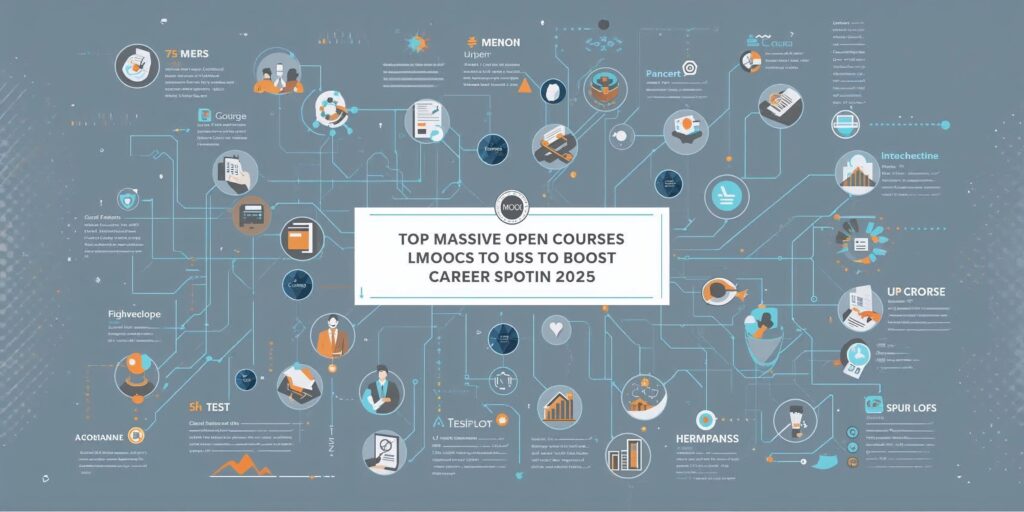
Here are clear paths you can follow. Each path shows starter courses and next steps.
Path A — Start a career in AI / Machine Learning
- Beginner: “AI Essentials” or “Intro to AI” (Coursera) — learn what AI can do.
- Next: Python and math basics (many Coursera, DataCamp, or Udacity courses).
- Project: Build a small AI demo (chatbot, image recognizer).
- Certify: Professional certificates from Google or IBM (on Coursera).
Path B — Become a Data Analyst / Data Scientist
- Beginner: “Data Analyst” certificate (IBM on Coursera) or DataCamp’s data tracks.
- Next: Learn SQL, Python, and data visualization.
- Project: Analyze a public dataset and make a report.
- Certify: Advanced data science or machine learning courses; put projects on GitHub.
Path C — Work in Cloud & DevOps
- Beginner: Cloud fundamentals (AWS, Google Cloud or Azure beginner courses).
- Next: Learn infrastructure as code and DevOps practices.
- Project: Deploy a web app to the cloud.
- Certify: Cloud provider certificates and Nanodegree style programs (Udacity).
Path D — Move into Cybersecurity
- Beginner: “Cybersecurity Analyst” (IBM on Coursera).
- Next: Learn network security and ethical hacking basics.
- Project: Do hands-on labs and capture-the-flag exercises.
- Certify: Professional certificates and vendor courses.
Path E — Grow in Business & Leadership
- Beginner: Short leadership or communication courses (LinkedIn Learning or Coursera).
- Next: Project management or product management certificates.
- Project: Lead a small team or complete a capstone project.
- Certify: Business certificates from top universities.
Real tips to learn faster and finish the course
Learning is easy when you follow a good plan. Here are simple tips:
- Set a small daily goal. For example, 30 minutes a day.
- Make a study schedule and stick to it.
- Do the projects. Projects turn what you learn into proof you can do the job.
- Take notes in your own words. This helps you remember.
- Teach someone else. If you can explain it, you really know it.
- Join study groups or forums. Other learners help you when you’re stuck.
- Apply quickly. Try to use new skills on real problems at work or in small projects.
Certificates vs. Skills — what matters more?
A certificate is like a trophy. It shows you finished a course. But what employers really want is what you can do. So:
- A certificate helps your resume get noticed.
- Skills and projects help you get the job.
- Best plan: get a certificate and make at least one real project.
When you put both on your resume, you look stronger. Also, certificates from big companies (like Google or IBM) often carry more weight.
Cost: How much do MOOCs cost and how to save money
Courses can be free, paid, or subscription-based. Here’s how to save:
- Audit for free. Many Coursera and edX courses let you watch videos for free.
- Financial aid. Some platforms give free financial aid to learners who need it.
- Subscription trials. Platforms like Coursera, DataCamp, and LinkedIn Learning often have monthly plans. If you study fast, one month may be enough.
- Look for sales. Udemy often has deep discounts.
- Use free projects. Build a portfolio without paying for extra services.
How to show your learning to an employer
After you finish a course, show your work using these easy steps:
- Add the certificate to your resume and LinkedIn. Put the course name and the platform.
- Share your project on GitHub or a website. Add a short note that explains what it does.
- Make a portfolio slide or short video. Show what you built and why it matters.
- Practice talking about it. In an interview, explain your project simply: what you did, how you did it, and the result.
Employers love clear, short explanations. You don’t need to use fancy words — simple is best.
Top MOOC course examples (practical picks for 2025)
Below are specific courses people pick to boost careers. These are popular and useful:
- Google — AI Essentials (Coursera) — teaches AI basics and how to use AI in work. This was one of the most popular courses in recent years.
- IBM Data Analyst Professional Certificate (Coursera) — a strong start for data roles.
- IBM Cybersecurity Analyst Professional Certificate (Coursera) — for security jobs.
- Coursera Guided Projects — quick hands-on lessons to learn tools in under 2 hours. These help you build small skills fast.
- Udacity Nanodegree in AI or Cloud — project-based learning for job skills.
- DataCamp Career Tracks — for practical data skills and exercises.
These courses and tracks are helpful because they focus on real work skills and projects.
Short success stories (easy to follow)
Here are short and real-style stories to show how MOOCs can help.
- Story 1 — Maya wanted a data job. She took a data analyst certificate. She did a small project analyzing sales data and posted it on GitHub. Then she applied for jobs and landed an interview because she could show real work.
- Story 2 — Rahim wanted to learn AI. He took Google’s AI Essentials and then a practical AI certificate. He built a small chatbot project. He used that project in job interviews and got a junior AI role.
These stories show one rule: projects matter.
Mistakes to avoid
When learning online, people sometimes make these mistakes. Avoid them:
- Taking too many courses at once. Focus on one path.
- Skipping projects and quizzes. Practice is where learning happens.
- Choosing only free courses that have no structure. Some free stuff is great, but choose a course with clear steps.
- Not showing your work. If you don’t post projects, employers may not see what you can do.
How to measure if a MOOC helped your career
You can check if a course was useful by asking:
- Did I build a project I can show?
- Can I do new tasks at work because of this course?
- Did I get interviews or job offers after finishing the course?
- Am I more confident using the tool or technique?
If the answer is yes, the course helped.
Trends to watch in 2025 (simple list)
Here are short trend points to keep an eye on:
- AI and GenAI are growing fastest. More people learn AI now than before.
- Short, project-based courses are popular. Employers like real work examples.
- Companies are creating their own certificates. Google, IBM, and others make programs that employers trust.
- Soft skills still matter. Communication and problem solving remain important.
A 6-week plan to power up your career (very simple)
Here is a small, clear plan you can follow in six weeks. It works for most beginners.
Week 1 — Pick a goal and a course
Pick one skill (for example AI basics), and enroll in one course.
Week 2 — Learn the basics
Watch the first 25–50% of the course. Take notes.
Week 3 — Start a project
Pick a small project related to the course. For AI, maybe a simple chatbot.
Week 4 — Finish the course
Complete the lessons and quizzes.
Week 5 — Polish the project
Make the project work well. Write a short readme file that explains it.
Week 6 — Share and apply
Put the project on GitHub or a website. Add the certificate to your resume and start applying for jobs or internal roles.
This plan keeps things small and doable, and it builds something you can show.
Extra resources and where to learn more
If you want to explore platforms and read reports, here are helpful sources:
- A big list of MOOC platforms and their features (useful to compare choices).
- Coursera’s Job Skills and Job Skills Report for trends and fastest-growing skills.
- Articles and reports on AI and workplace trends by trusted consultancies and news outlets.
Final advice on Top Massive Open Online Courses (MOOCs) to Boost Your Career in 2025— short and clear
- Choose one skill. Then focus.
- Do a project. This is the most important step.
- Get a certificate from a trusted source if you can.
- Keep learning. The job world changes fast. Skills like AI, data, cloud, and security are very useful today.
Closing — your next steps (very simple)
- Write one sentence: “I want to learn ___ (for example: AI basics).”
- Pick a short course from Coursera, DataCamp, Udacity or LinkedIn Learning.
- Make one small project and share it.
- Keep learning one step at a time.
If you do these steps, you will be much closer to your next job or promotion.
Learning online is powerful — and with the right plan, you will make it work for you.
Notes about the data used here
This guide uses recent reports and course lists from MOOC trackers and platform reports.
For example, surveys and job-skill reports show that AI and data skills are the fastest-growing areas of learning in 2024–2025.
And some AI courses (like Google’s AI course) had very large enrollments.
Also, lists of MOOC platforms show a wide set of trusted providers you can choose from.
Frequently Asked Questions
Which course has high demand in 2025?
In 2025, the courses with highest demand are those teaching Generative AI / AI fluency and Data Science & Analytics, because companies everywhere want people who can build or use AI tools and make sense of data to make decisions.
What is the best course to study in 2025?
The best course to study in 2025 is Artificial Intelligence and Machine Learning, since AI is the fastest-growing skill globally and is being adopted in almost every industry. Pairing it with Data Science or Cybersecurity makes you even more job-ready, as both fields are in high demand and pay well.
Which MOOC is the most popular?
The most popular MOOC right now is Google’s AI Essentials on Coursera, which became the top course in 2024 with record enrollments worldwide. Its popularity shows how much demand there is for practical AI skills that anyone can apply at work.
Which online course is best for the future?
The best online course for the future is one in Artificial Intelligence and Data Science, since these skills are powering new jobs and industries across the world. Courses in Cybersecurity, Cloud Computing, and Digital Marketing also stand out, as they prepare you for fast-growing careers that will stay relevant for years.
Are MOOCs really useful for jobs?
Yes. If you learn real skills and make projects, employers notice.
How long does a good course take?
Some take a few days. Certificates may take a few months. It depends on the course.
Are certificates expensive?
Some are free. Some cost money. There are many ways to save, like financial aid and sales.
Do employers trust online certificates?
Many do, especially if they come from big companies or good universities.



